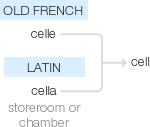Cell
Old English, from Old French celle or Latin cella ‘storeroom or chamber’.
wiktionary
From Middle English celle, selle, from Old English cell (attested in inflected forms), from Latin cella(“chamber, small room, compartment”), later reinforced by Old French cel, sele, Old French cele. Doublet of cella; ultimately from Proto-Indo-European *ḱelneh₂, from Proto-Indo-European *ḱel-(“to cover”).
From cell phone, from cellular phone, from cellular + telephone
etymonline
cell (n.)
early 12c., "small monastery, subordinate monastery" (from Medieval Latin in this sense), later "small room for a monk or a nun in a monastic establishment; a hermit's dwelling" (c. 1300), from Latin cella "small room, store room, hut," related to Latin celare "to hide, conceal," from PIE root *kel- (1) "to cover, conceal, save."
From "monastic room" the sense was extended to "prison room" (1722). The word was used in 14c., figuratively, of brain "compartments" as the abode of some faculty; it was used in biology by 17c. of various cavities (wood structure, segments of fruit, bee combs), gradually focusing to the modern sense of "basic structure of all living organisms" (which OED dates to 1845).
Electric battery sense is from 1828, based on the "compartments" in very early types. Meaning "small group of people working within a larger organization" is from 1925. Cell-body is from 1851, cell-division from 1846, cell-membrane from 1837 (but cellular membrane is 1732), cell wall from 1842.
